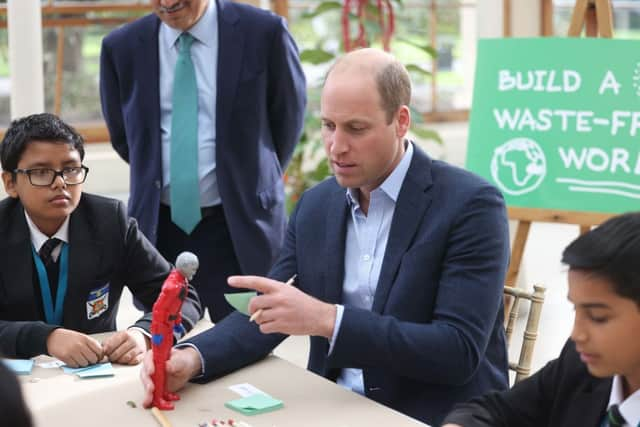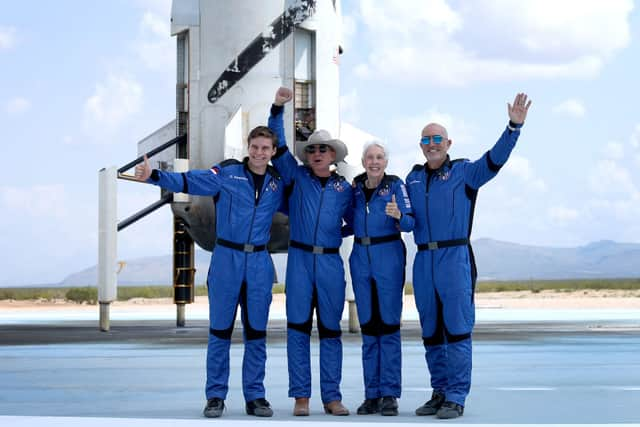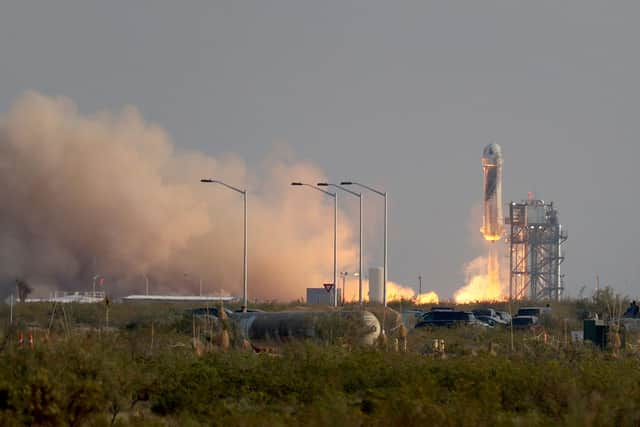Prince William: Duke criticises ‘space race’ after William Shatner visits space on Blue Origin flight
This article contains affiliate links. We may earn a small commission on items purchased through this article, but that does not affect our editorial judgement.
and live on Freeview channel 276
The Duke of Cambridge Prince William has criticised the ongoing billionaire space race that saw Star Trek actor William Shatner become the oldest person in history to travel to space.
This is what you need to know.
What has Prince William said?
In an interview with BBC Newscast on BBC Sounds, which aired the day after William Shatner made history by becoming the oldest person to visit space, Prince William said that he has “absolutely no interest” in becoming a space tourist.
Advertisement
Hide AdAdvertisement
Hide AdThe duke said what the carbon footprint of short journeys into space would be is a “fundamental question”.


He said: “I think for me particularly the idea of this space race that’s on at the moment - we’ve seen everyone trying to get space tourism going - it’s the idea that we need some of the world’s greatest brains and minds fixed on trying to repair this planet, not trying to find the next place to go and live.
“And I think that ultimately is what sold it for me is that, that really is quite crucial.
“We need to be focusing on this one rather than giving up and heading out into space to try and think of solutions for the future.”
Advertisement
Hide AdAdvertisement
Hide AdWhen asked by presenter Adam Fleming about whether he would like to become a space tourist one day, Prince William replied: “Do you know what, I have absolutely no interest in going that high.
“I’m a pilot, but I’m a helicopter pilot so I stay reasonably close to the ground.
“I’ve been up to 65,000 feet once in a plane, that was truly terrifying. That’s high enough.”
What is the space race?
The billionaire space race that the Duke of Cambridge spoke about refers to the current trend of some of the world’s wealthiest billionaires developing their own space programmes.
Advertisement
Hide AdAdvertisement
Hide AdRichard Branson, founder of Virgin and subsequently Virgin Atlantic, travelled to the edge of space early in July 2021, with Amazon billionaire Jeff Bezos following not long after.


In September, Elon Musk’s SpaceX launched its first private flight, though Musk was not among the four passengers thrust into orbit.
Space tourism has seen Branson, Bezos, Musk and others collecting thousands for seats upon their aircrafts.
Tourists are expected to pay some £180,000 for a spaceflight on Virgin Galactic, and an undisclosed amount of money aboard Bezos’ Blue Origin spaceflights.
What impact has the space race had on the environment?
Advertisement
Hide AdAdvertisement
Hide AdIn order for rockets to be launched into space, they require huge amounts of propellants.
Dr Simit Raval, a senior lecturer at the University of New South Wales, says that the two biggest environmental impacts of space travel are its contribution to global warming and stratospheric ozone loss.
According to a recent analysis on space launch emissions, co-authored by Raval, “the environmental impact of space launches is becoming increasingly significant”.
The report said: “While there are a number of environmental impacts resulting from the launch of space vehicles, the depletion of stratospheric ozone is the most studied and most immediately concerning.”
Advertisement
Hide AdAdvertisement
Hide AdIt continued on to say that further studies are required to understand “the cumulative impacts that frequent space launches have on all areas of the environment, including global climate, ecosystem toxicity, and human toxicity”.


Dr Eloise Marais, Associate Professor in Physical Geography at University College London, says “globally, rocket launches wouldn’t need to increase by much from the current 100 or so performed each year to induce harmful effects that are competitive with other sources, like ozone-depleting chlorofluorocarbons (CFCs), and CO₂ from aircraft”.
She states: “During launch, rockets can emit between four and ten times more nitrogen oxides than Drax, the largest thermal power plant in the UK, over the same period.
“CO₂ emissions for the four or so tourists on a space flight will be between 50 and 100 times more than the one to three tonnes per passenger on a long-haul flight.”
Advertisement
Hide AdAdvertisement
Hide AdA message from the editor: Thank you for reading. NationalWorld is a new national news brand, produced by a team of journalists, editors, video producers and designers who live and work across the UK. Find out more about who’s who in the team, and our editorial values. We want to start a community among our readers, so please follow us on Facebook, Twitter and Instagram, and keep the conversation going. You can also sign up to our newsletters and get a curated selection of our best reads to your inbox every day.
Comment Guidelines
National World encourages reader discussion on our stories. User feedback, insights and back-and-forth exchanges add a rich layer of context to reporting. Please review our Community Guidelines before commenting.
